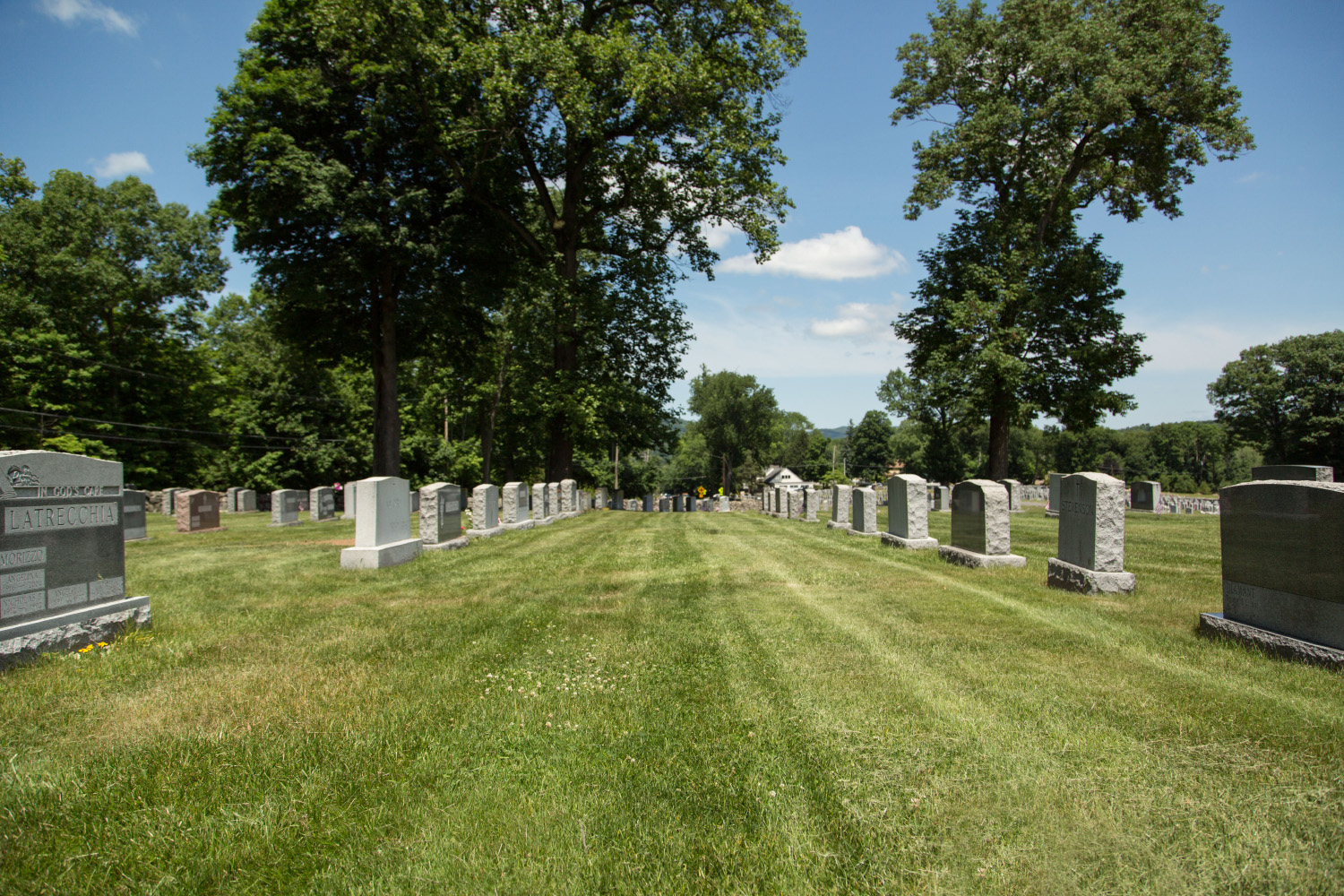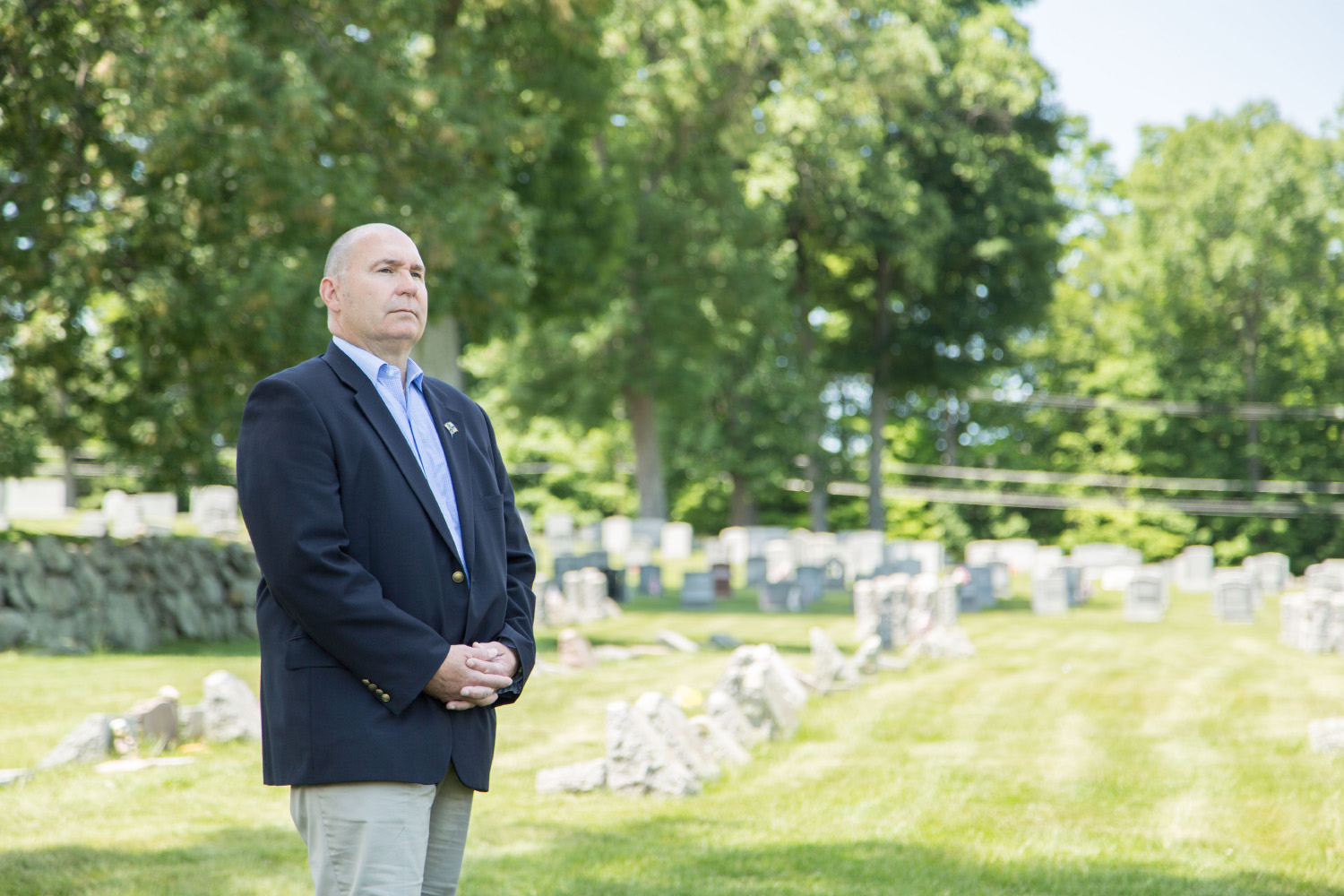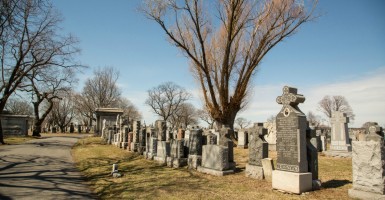Dennis Flynn’s ties to the Roman Catholic Archdiocese of Newark run deep: he’s been a parishioner there since he was 3 years old, he and his wife were married there, their children were wed in the parish and their grandchildren have all been baptized in the archdiocese’s churches.
Flynn’s mother and father, as well as his brother who passed away after a football game, are buried at Maryrest Cemetery, one of the 11 Catholic cemeteries owned and operated by the archdiocese.
So when Flynn and his wife, Heidi, lost their 35-year-old son, Dennis, unexpectedly in 2012, it made sense to the family that he, too, would be buried at Maryrest Cemetery.
It took the Emerson, N.J., family nearly a year to purchase a headstone, though.
After a lengthy and frustrating process of trying to find the right seller, the Flynns decided to purchase from a familiar place: the church.
“We just felt more comfortable dealing with people of our faith, and there was no pressure put on, no salesmanship, other than it just felt like that was the right way to do it,” Flynn told The Daily Signal.
Little did they know, though, that the archdiocese’s ability to sell those monuments to its parishioners would be halted by the New Jersey legislature after a law—backed by the powerful industry group Monument Builders Association of New Jersey—was passed prohibiting religious institutions from doing so.
That law is now the subject of a lawsuit Flynn and fellow parishioner Emilio Mazza filed against New Jersey Gov. Chris Christie and Attorney General John Hoffman with the help of the public interest law firm Institute for Justice.
“It’s partially my religious freedom,” Flynn said. “I should be able to do what I want and be able to buy what I want. They’re narrowing the field, and any time you limit the choices of where you can purchase something, it usually doesn’t work out in the consumer’s favor.”
While the case centers on the New Jersey law, at the heart of it is what the Institute for Justice said is a blatant violation of economic liberty, and one that affects not only the Archdiocese of Newark, but small business owners and entrepreneurs trying to break into industries dominated by big business and powerful trade groups.
“The archdiocese’s case symbolizes the struggle of consumers and entrepreneurs across the country to engage in commerce without unreasonable interference,” Jeff Rowes, a senior attorney at the Institute for Justice who represents the archdiocese, told The Daily Signal. “We’re seeking to establish legal precedent to protect not just the archdiocese, but consumers and entrepreneurs across the country.”
>>> Federal Court Strikes Down ‘Discriminatory’ Texas Voter ID Law
Inscription Rights
The program that provided Flynn and his wife with the opportunity to purchase a monument directly from the archdiocese began in 2006.
Called an “inscription-rights program,” it sought to streamline the process for parishioners purchasing plots in the 11 cemeteries owned by the archdiocese and allowed the archdiocese to provide its parishioners with monuments and mausoleums.
Parishioners have the items inscribed and virtually “rent” the monument for eternity.
Traditionally, parishioners purchased monuments, such as headstones and mausoleums, through private monument businesses and owned them directly. The archdiocese, though, was responsible for caring for and maintaining the monuments in perpetuity, and often bore the cost of doing so. Additionally, the archdiocese didn’t have the legal right to alter or repair them.
Under the inscription-rights program, the archdiocese owned the monuments and mausoleums and were able to conduct any maintenance needed without permission from the parishioners. Doing this helped build revenue for the parish and ensured that the monuments received proper care after the parishioners passed away.
The archdiocese expanded its inscription-rights program in 2013, and after doing so, it faced significant backlash from private monument businesses. According to court filings, John Burns, president of the Monument Builders Association of New Jersey and owner of his own monument business near one of the archdiocese’s cemeteries, protested the inscription-rights program.
Burns, the documents say, called on the archdiocese to terminate its new program because of the negative impact it would have on his and other private monument businesses.
The archdiocese declined.

One of the cemeteries owned by the Roman Catholic Archdiocese of Newark. (Photo: Institute for Justice)
Not ‘Their Product to Sell’
After the Archdiocese decided to continue its program, the Monument Builders Association of New Jersey filed a lawsuit in state court challenging the church’s ability to sell headstones.
The group argued it was “unfair” for the Archdiocese to sell headstones because they have a relationship with parishioners, thus giving them a competitive advantage.
“I don’t think it’s their product to sell,” Burns said in court. “I think it’s our product to sell.”
In May 2014, the state court ruled against the Monument Builders Association of New Jersey on the grounds that state law permitted the archdiocese to sell monuments.
The group appealed, but the New Jersey Superior Court appellate decision sided once again with the archdiocese.
Taking the Case to the Legislature
After losing in court twice, the Monuments Builders Association of New Jersey took the issue to the state legislature.
In October 2014, a bill was introduced in the general assembly prohibiting religious institutions from selling memorials, mausoleums and burial vaults.
According to lobbying disclosures filed with the state Election Law Enforcement Commission, the Monument Builders Association was one of the only groups that lobbied in favor of the bill.
Though the legislation applied to all religious entities in New Jersey, the Archdiocese of Newark was the only religious institution selling headstones and mausoleums at the time.
In December, the legislation passed both the state senate and the general assembly with overwhelming support. In March, Republican Gov. Chris Christie signed a revised version of the bill into law.
>>> Houston Churches Sue City for Trying to Take Their Private Property
A ‘Favored Pastime’
Appeals courts across the country have weighed in on the issue of economic protectionism, or a policy of protecting specific producers, and they’re at odds.
The 10th and 2nd U.S. Circuit Courts of Appeals have ruled that state legislatures have the power to regulate industries even if legislation or regulations implemented have no public purpose.
In fact, in a 10th Circuit opinion from 2004 regarding the rights of a casket business to sell online without licensing, Chief Circuit Judge Deanell Reece Tacha referred to doling out special benefits to lobbyists as a “favored pastime” of governments.
“We also note, in passing, that while baseball may be the national pastime of the citizenry, dishing out special economic benefits to certain in-state industries remains the favored pastime of state and local governments,” she wrote.
Meanwhile, the 5th, 6th and 9th Circuits have ruled to the contrary, saying instead that regulations imposed by state legislatures are unconstitutional when they have no purpose other than to serve as a form of economic protectionism.
The Supreme Court has shied away from the issue. Most recently, the high court decided not to hear a case involving monks selling low-cost handmade caskets in Louisiana.
In the case, the 5th Circuit ruled that “economic protection of a particular industry” isn’t a “legitimate governmental purpose.” The Supreme Court’s decision to pass on the case left the appeals court’s ruling standing.
“The Supreme Court has not yet decided to referee this dispute, but it may not be able to put off forever the need to resolve this important intercircuit conflict,” The Heritage Foundation’s Alden Abbott and Paul Larkin wrote in March about a similar economic protectionism case.
“[I]f the state’s decline to revise their regulatory schemes to eliminate their unjustifiable exclusionary effect, it is likely there will be yet another round of challenges to those programs—this time based on the federal Constitution,” they continued.
Despite the high court’s unwillingness to hear previous cases involving economic liberty, Rowes, with the Institute for Justice, is confident the archdiocese’s could be the one to settle the issue.
“We are litigating the case with an eye toward laying the foundation for review of the Supreme Court,” he said. “It’s an issue that the justices recognize is an important issue, but they’re allowing it to percolate.”
Because the circuit courts disagree on the issue, Rowes said the Supreme Court will have to address economic protectionism eventually.
“The country we live in is the one created by the Supreme Court. If you look around, you don’t see restrictions on religion, but you do see restrictions on economic activity,” he said. “The Supreme Court takes our rights of religion and free speech very seriously. The court is very passive when it comes to economic regulation.”

Andrew Schafer serves as the executive director of Catholic cemeteries for the Archdiocese of Newark. The Archdiocese sued the Christie administration over a new law the archdiocese argues infringes upon its economic liberty, as the law prohibits the archdiocese from selling headstones to its parishioners. (Photo: Institute for Justice)
Like ‘Climbing Mount Everest’
Though Rowes contends that the Supreme Court has to address the issue of economic protectionism eventually, he recognizes that winning an economic liberty case is like “climbing Mount Everest.”
“The issue with the courts is it’s not just that the judges believe that economic protectionism is a good thing,” he said. “It’s just that they believe the Constitution doesn’t allow the courts to reject it. Courts have to defer to the legislature, even though it’s apparent they’re serving the interest of a small special interest.”
Though the Flynns are able to keep their headstone because the sale occurred before the legislature’s actions, Rowes anticipates that the archdiocese’s case will have broader consequences.
In Philadelphia, Penn., and New York, parishes are considering adopting similar programs, and Rowes said there’s “legislative backlash” by private monument companies.
It’s his hope that the archdiocese’s case will “vindicate the rights” of those parishes, as well as entrepreneurs and consumers.
“The plaintiffs demonstrate the depth of the parishioners’ commitment to the perpetual care for the remains of their loved ones and the trust they place in the church. [This case] illustrates the gravity of violating people’s economic liberty,” Rowes said. “Some of the most important decisions we make are decisions that are economic in nature. If you prohibit people from engaging in commerce, you can be interfering with some of the most intimate and important decisions they make.”
>>> Dreams Demolished: 10 Years After the Government Took Their Homes, All That’s Left Is an Empty Field































